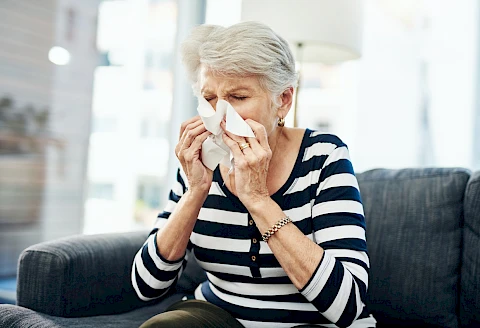
With age, our immune systems change and sometimes become more sensitive to allergens, making allergy management a critical aspect of senior care. This article explores common allergens, their symptoms, and valuable strategies for managing them effectively in a senior care setting. We can create a healthier environment for our seniors.
Identifying Common Allergens
Seniors may encounter a range of allergens in their daily lives, from dust mites and mold spores to pet dander, pollen, and certain foods or medications. These allergens can provoke an immune response, leading to uncomfortable or even severe allergy symptoms. Awareness of these allergens is the first step in addressing the problem. By knowing which allergens to avoid, caregivers can better protect their senior family members and enhance their quality of life.
Recognizing Allergy Symptoms in Seniors
Recognizing allergy symptoms is crucial for timely intervention. Typical symptoms include sneezing, coughing, itchy eyes, and runny nose. In severe cases, individuals can experience breathing difficulties.
However, allergy symptoms in seniors might not always look the same. Reduced mobility and chronic health conditions can sometimes mask or complicate allergic reactions. Regular health checks and keen observation of physical and behavioral changes are crucial in the early identification and successful management of allergies.
Allergy Management Strategies
Some vital strategies can prove particularly effective when it comes to minimizing allergen exposure and managing allergies.
- Regular Cleaning: Cleaning our home is one of the most straightforward and effective methods to reduce allergen exposure. It's essential to clean all areas of the house, particularly spaces like bedrooms and living areas where seniors spend most of their time. Using hypoallergenic cleaning products and ensuring good ventilation during cleaning can also keep allergens at bay.
- Using Air Purifiers: Air purifiers filter out small particles, including common allergens like dust, pollen, and pet dander. Purifiers significantly benefit households with pets or in regions with high pollen counts. Caregivers should choose air purifiers specifically designed to target allergens and maintain these devices regularly for optimal performance.
- Developing Personalized Management Plans with Healthcare Professionals: Everyone and their response to allergens are unique. Therefore, allergy management should o meet the unique needs of each senior. Working with a healthcare professional to understand a senior's specific triggers, symptoms, and overall health can aid in the development of an effective management plan. This plan should include details on medication, diet modifications, and lifestyle changes that will help reduce allergy symptoms.
Senior Helpers Can Help With Allergy Management
Allergies can significantly impact seniors' well-being, making effective allergy management an essential part of high-quality senior care. By understanding common allergens, recognizing symptoms, and employing management strategies, caregivers can help seniors live more comfortably.
At Senior Helpers, our commitment goes beyond addressing our clients' basic needs; we also focus on ensuring their environment is as allergen-free as possible for optimal health and well-being.
If you reside in Allentown, Bethlehem, Nazareth, Whitehall, or Schnecksville, and you're looking for skilled and empathetic caregivers for your loved ones, don't hesitate to contact us at Senior Helpers Lehigh Valley. We would love to discuss our servicesfor seniors and their caregivers, such as Personal Care and Chronic Disease Care.